Himachal Assembly tables key legislative reforms to address governance, Introduces a new bill
During the winter session of the Himachal Pradesh Assembly, the government proposed amendments to three existing laws and introduced a new bill aimed at addressing critical governance and administrative issues. The legislative package includes changes to the Himachal Pradesh Police Act, 2007, the Himachal Pradesh Panchayati Raj Act, 1994, and the Himachal Pradesh Ceiling on Land Holdings Act, 1972, alongside a new bill to clarify the status of contractual employees in public service.
New Bill to Define Role of Contractual Employees
Chief Minister Sukhvinder Singh Sukhu introduced a new bill to resolve long-standing confusion surrounding the status of contractual employees in public service. The legislation aims to balance the rights of regular government employees with those of contractual workers, all while maintaining fiscal stability for the state.
The bill draws its authority from Article 309 of the Indian Constitution, which allows states to regulate recruitment and service conditions of public employees. Since 2003, contractual appointments have been common in Himachal Pradesh, but debates have arisen over whether these employees should enjoy the same benefits, seniority, and privileges as their regular counterparts.
The legislation clarifies that contractual employees will not be considered equivalent to regular government staff, and their service terms will continue to be governed by their initial agreements. Financial constraints and potential disruptions to seniority lists were major considerations for this move.
Panchayati Raj Act Amendment to Boost Rural Representation
An amendment to the Himachal Pradesh Panchayati Raj Act, 1994, was introduced to address the challenges posed by the state’s unique geographical and administrative conditions. Presented by Rural Development Minister Anirudh Singh, the proposal modifies the existing population-based formula for electing Zila Parishad members.
The amendment enables the government to create regional constituencies for backward gram panchayats with populations below 25,000, considering factors like tough terrain, limited transport, and administrative convenience. This change aims to ensure that even sparsely populated and remote areas receive fair representation in district councils, fostering inclusive local governance.
Police Act Amendment for Legal Safeguards to Officials
The Assembly also saw a proposal to amend the Himachal Pradesh Police Act, 2007, to protect government officials from unwarranted legal action. Chief Minister Sukhu, who also oversees the Home Department, presented the amendment to Section 65, which requires prior government approval before officials can be arrested for actions taken during their official duties.
The amendment also simplifies recruitment by transferring the hiring of non-gazetted police officers to a centralized state-level recruitment board, replacing district-level systems. Additionally, it eliminates the need for separate district and state cadre rolls for certain officer categories, streamlining administrative processes.
Land Holdings Act Amendment to Support Charitable Initiatives
Revenue Minister Jagat Singh Negi introduced an amendment to the Himachal Pradesh Ceiling on Land Holdings Act, 1972. The proposal seeks to increase the land ownership limit for charitable, religious, and spiritual organizations to 30 acres, up from the current restrictions.
This change addresses challenges faced by organizations like Radha Soami Satsang Beas, which manage charitable initiatives such as hospitals and schools. The amendment includes safeguards to prevent misuse, stipulating that the land must be used strictly for charitable, religious, or spiritual purposes, failing which it will revert to the state.
Supporters argue that the amendment will enhance the management of essential services in rural areas, while critics caution against the potential exploitation of this provision by influential groups under the guise of philanthropy.
These legislative initiatives reflect the government’s commitment to resolving administrative bottlenecks, clarifying employee policies, and fostering inclusive governance. As the Assembly debates these proposals, transparency and accountability are expected to remain central to ensuring their successful implementation. If enacted, these reforms could serve as a blueprint for addressing similar challenges in other states.



